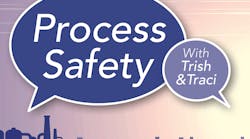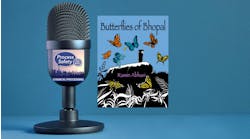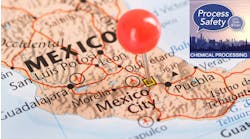Podcast: Take Advantage Of Downtime To Ramp Up Safety Training
This episode of Process Safety With Trish & Traci uncovers best practices for presenting and attending safety training virtually. Links to resources are in the transcript below.
Transcript:
Traci: Welcome to this edition of "Process Safety with Trish & Traci," the podcast that aims to share insights from current incidents to help avoid future events. I'm Traci Purdum, Senior Digital Editor with Chemical Processing, and, as always, I'm joined by Trish Kerin, the Director of the IChemE Safety Centre. Trish, what's going on with you lately?
Trish: Well, it's an early morning here in Australia at the moment but, you know, I think we're still in a form of lockdown but we're doing okay down here. So we're hopeful that we've got the pandemic a little bit more under control at the moment as we go forward.
No worries! Subscribe and listen whenever, wherever.
Traci: Absolutely. And our current circumstance certainly puts more time on our plates and many of us are trying to use that time wisely. Today's topic is how to achieve better safety training. Something that can be addressed online virtually, so that comes in handy. In fact, Chemical Processing offers credits for its Process Safety Webinar series. Credits are distributed by the Mary Kay O'Connor Process Safety Center. Those are hour long events and you serve as the subject matter expert for many of them. But my question is, can online training or learning be effective where safety is concerned?
Trish: Look, I think it can. We need to make sure that we understand what we're trying to achieve in a training course and how we can shape that training course to provide the best knowledge transfer for people. We also need to remember that training alone does not actually make us competent in something. Training, during the training course, gives us the knowledge and the basis. To become truly competent in it, we actually have to get out there and practice it, and experience it, and learn. And some of that requires mentoring, which can be a challenge in these disconnected times, but that could also still be done, as well as coaching, developing, and then just practice.
So there needs to be a balance, but the knowledge transfer, it can be done in an online environment. There are good online platforms and there are perhaps platforms that could be a little bit better, but it is also important to remember, you mentioned the webinars that we do together. Continuing professional development for engineers is absolutely critical, and doing things like listening to this podcast is actually a form of continuing professional development, as is doing, attending a webinar, reading a journal. All these things contribute to your underlying basis of knowledge, and that's a really important thing to remember as well. There are all different sorts of training that we can actually do and development that helps us become better at what we do and leads us more down that competency pathway, and they're really important things to keep in mind.
Traci: And you had mentioned there are some better courses out there. Can you cite some specific courses or some direction for folks to go that they can kind of get on the right track so they're not wasting their time on certain things?
Trish: In terms of the development of a good online course, if that's what people are looking at, at the moment, it's really important to remember that you can't just take a face-to-face course and deliver it over a conferencing platform. That's not an online course, that is just delivering a presentation. You actually need to factor in how you will interact with the attendees, how you will get their feedback, how you will encourage discussion amongst them. It may be that you need to make sure that they do assignments outside of the group conference call.
Some of the things that you can actually do even is have prerecorded sessions for them that they have to watch and then you bring them in together to a video conferencing system to do some workshops, and some activities, and some interactive discussion parts. Because we can't forget that one of the key important things about developing analogy, sometimes bouncing our ideas off others, and being able to test what we're thinking, and test what others are thinking as well. You need to make sure you've got that interaction built into your program, it's a really important thing to do.
Certainly, from the Institution of Chemical Engineers' perspective, we have a lot of pre-established online programs. We do have some prerecorded things that are more just a knowledge sort of transfer down to you. But we have other programs as well where it is very interactive. You'll go and you'll watch a little video beforehand, and you'll come in, you'll have your interactive discussions, you'll do workshops together. We’ve got a lot of training programs like that. We're also delivering a lot of webinars internally at the moment as well because we do see that it's not just about doing the training course. It is also about other forms of continuing professional development. So certainly if anyone's interested in looking at what we've got, our website, icheme.org. On the very front page, there's a IChemE update on COVID-19, and you can go in there and it will direct you to all sorts of different CPD-based development activities that are available to you at this time. Likewise, I am sure that the AIChE also has some very good programs as well.
Traci: And for the IChemE, you don't have to join anything. You don't have to pay for anything. They just simply register, right?
Trish: Correct. So some of the programs are complimentary and anybody can come in and register into those. Some of them are actually proper online training programs, and just like you would register to go to a face-to-face training course, you will register, and pay to go to an online training course as well because it is actually a formal training program. So there's a blend of both. There is the free stuff to provide you high quality continuing professional development at this time. And then there's very specific stuff, you know, do we need to understand management and leadership as a heads up activity? Do you need to understand some of the fundamental approaches to safety? So we've got some very specific, tailored programs as well.
Traci: And obviously safety training is paramount for safety's sake. But what else is gained from staying on top of events and incidents?
Trish: Well, you've heard me say before that there are probably no new incidents. We just keep repeating the old ones. There is still always something new to learn from the incident that occurs. And sometimes it might be something as simple as, "Why didn't we learn about this one because it's happened before?" So staying on top of what is going on is really important in understanding what the potential issues are, particularly in this environment we're living in at the moment. So right now, for example, we're seeing an enormous number of factories and plants reconfigure to produce products such as hand sanitizer. Now, hand sanitizer doesn't sound all that hazardous, but hand sanitizer is mostly ethanol, which is a highly flammable product.
Traci: Right.
Trish: Tends to burn quite clear. So when it's on fire, you also can't see it. So that can be quite concerning in itself. If you've got a facility that's not used to handling bulk quantities of ethanol that are now doing that, how are they managing that safely? And we're starting to see some incidents occur around the world of ethanol-related fires from plants that have, all of a sudden, started making hand sanitizer. So we need to try and ensure that we've got really good learning mechanisms to get incident notification out, so that we can actually understand what's going on.
And so that, you know, if I am a plant that's just working on developing hand sanitizer at the moment, I think that I need to go and check on what other people are doing with ethanol. Then if I can go and find out what incidents I've had, I can try and make sure I don't have that incident. Because we do tend to learn a little bit from the current incidents right at the time they happen, because they're fresh in our mind, we then forget it. You know, weeks, months down the track we forget that a plant blew up making hand sanitizer and we're now making hand sanitizer. But at that time, at least, we can take that learning, and if we're just adapting our facility into making something, it's a good time to adapt in the controls to prevent the incident happening in the first place. So I think that's a really important thing to be aware of.
The other thing that's really important at the moment is if you are changing what you're doing, either if you are making a new product, if you are running your facility on reduced resourcing levels because of absenteeism and sickness, or whether you've had to actually lay off people because of the economic situation, but you're still running in part, you need to do a management of change and understand whether you've got the right controls in place to do that safely. So it's not just about understanding what else is going on. It's about really understanding what's going on in your facility, too.
Traci: And you bring up an interesting point of... You and I were chatting before we started recording. You changed from an iPhone to a Samsung. And so having to figure that out works the brain a little bit. Are there other industries that we can be looking at to learn from? Not necessarily just sticking with the chemical industries. But are there other industries where we can look to see other incidents and learn from those? So you know where I'm going with this? I tend to be babbling here.
Trish: I'm with you, Traci. I get you. Yeah. I think what I'd probably suggest is something like how they adapt to new technologies in the aviation sector. So, you know, we see that if you're the pilot of a 747, you can't just go and fly a A350, that's not how it works. You actually have to train on the specific technology you're going to be using. You have to then be certified on that technology. Now that's a lot of structure, a lot of process, a lot of detail. I'm not necessarily suggesting that we need to have that much. Although, if we're running complex plants that are worth hundreds of millions of dollars, perhaps we should be making sure that operators are trained in simulators, and tested, and certified to operate. I do think that is actually something we really need to get a lot better at doing.
But if it's minor technology changes that we're looking at, then what can we learn from how the aviation sector do that? They have the mandatory training processes that you have to go through. You have to be certified in it, you have to be on a simulator. You have to demonstrate that you can respond and take action in an emergency situation. And you have to be able to demonstrate you can do that reliably, not just a one-off luck. So I think there is some areas there that we could perhaps be implementing a little bit more into what we do. And obviously also the aviation sector is very experienced in the management of dealing with human factors. And I definitely think that's an area that in the processing industries we need to get a lot better at understanding and working with human factors.
Traci: Absolutely. And the aviation industry -- reliability and maintenance started with that paper long ago from the aviation industry [Traci was referring to the Nowlan and Heaps paper written in 1978 for United Airlines. It is considered to be the bible of reliability and maintenance. You can access it here]. And the Chemical Safety Board, isn't the new person in charge...isn't she from the aviation industry? (See:
“Senate Confirms Lemos To Chair Of Chemical Safety Board.”
Trish: I believe she's from the NTSB. So, yeah.
Traci: So you got a lot of crossover. And thank you for getting me out of the weeds there and thank you for understanding where I was going with that.
Trish: We've been doing this long enough now, I know where you're going.
Traci: Is safety training mandatory?
Trish: Look, I think a lot of safety training should be mandatory. I also think we need to be careful that we don't overdo the mandatory thing. So we need to be very careful to make sure we focus on what is important because we can't do everything. And I'm not suggesting that everybody needs to be an expert in absolutely everything. That is not how the world works and that is not ever going to be something practical to do. But what we do need to do is identify what are the key critical things that we need to worry about here and training on those need to be mandatory. And then we may well also say that some of that training needs to be refreshed on a periodic basis as well. Because there are some things that you actually shouldn't just qualify for one day and have forever.
Again, if I go back to the aviation example, you qualify as a pilot on your 787, you don't get to fly one forever without being re-validated. You still have to go through re-validation processes. But in a driving license, you get that once. You might question whether maybe we should be retested on that periodically too when you see some of the driving out there. But, you know, we need to focus on what do we think are the really key important things? What are the key critical tasks? And they need to be mandatory training. So things like induction is always going to have to be a mandatory training because when someone new comes on site, they need to understand what hazards they're going to confront and what they need to do about them at the most basic level. If something goes wrong, what do I need to do to keep myself safe and avoid putting anyone else in danger? That has to be a mandatory step that people go through.
Other steps could be that there are critical tasks in the operation. Yes, you have to have mandatory training on those because if that isn't done right, it can lead to an incident developing, or it can lead to someone getting hurt and not only process safety here. There's also the need for mandatory training with regard to personal safety or LHS as well. You know, how do I make sure that I don't hurt myself or someone else because I don't do something the right way? Does some of it need to be mandatory? Some of it doesn't need to be mandatory, I don't think, and I think we need to be careful that we don't try and solve safety problems with the OHS or process safety by thinking that that enormous folder on the desk full of three inches of paper is going to keep us safe because it's not. The paper is not gonna keep us safe. What we do in the plant, what we do in their life is what's going to keep us safe. We need to have documentation, but we also need to resist the urge to go through documenting everything in the thought that that's providing a safety because that is not safety. That is just bureaucracy.
Traci: Wise words right there. Do you have anything else you want to add on this subject?
Trish: Look, I think it's just important to take a moment at this particular point in time as well to reflect on what's going on in your workplaces, and in actual fact how you're dealing with what's going on. I mean there's a lot of people that were now working from home on an ongoing basis. We've got people doing jobs that we never would have thought could have been done from home. We need to reflect on what's working for us and think, "Okay, what could we learn to take forward when we come out of it?" But also, what's not working so well for us? And what can we do to try and fix it now before we get trapped into a pathway where we make poor or suboptimal decisions into the future? So take some time to reflect and think about, you know, what's working, what's maybe not working, and what we can do about it so that you can really then tailor what sort of training you might need.
Because when we see what's not working, it might actually throw up some ideas and we go, "Maybe we do need to do a little bit more training in that." And it might even be things like, "Maybe we do need to do a little bit more training in how to video conference with each other." It sounds silly, but actually there are some tips to make it a lot easier to do. And if you don't know what they are, then you can get yourself into a little bit of trouble at times. You know, everybody's been on that video call where someone's talking away and we're all saying, "You're on mute." It's happened to me. You know, it happens. So, I think reflection, I think, at this point, is really important. And reflection, taking the time to think about if you've got some spare time at the moment, and you're looking to try and develop your knowledge in an area, then take a look at what's happening because there's an enormous amount of really high quality material and we've got a whole lot of webinars that we've been running at the moment as well that are on all sorts of different topics. The webinars that we've got going at the moment at the Safety Center are doing all free, and then after we've run them, we upload them onto a YouTube channel.
So they're there for people to watch for as long as they want. You know, the specific topics that you want to brush up on and you see that there is a webinar on it, get on board, go into that webinar, check it out. We're running our case studies online, which is something that we've had to reflect on and do a little bit differently as well because these were designed to be facilitated face-to-face activity. We've had to turn our mind to how we facilitate the digital activity with people because the facilitation of our case study is the key to its quality. So, you know, we're sort of switching up on how we're doing some of these things as well. [Access the IChemE Safety Centre assets here.]
Traci: Well, great career lessons, great life lessons, if you think about it. So, I do appreciate your time, once again, helping us wade through some of these questions that we have about process safety and how to make ourselves safer. Unfortunate events happen all over the world and we will be here to discuss and learn from them. On behalf of Trish, I'm Traci, and this is "Process Safety with Trish & Traci."
Trish: Stay safe.
Check out all the episodes of Process Safety With Trish & Traci.
Want to be the first to know? Subscribe and listen to Process Safety With Trish & Traci on these platforms








